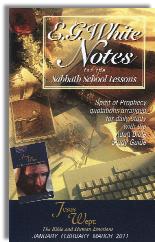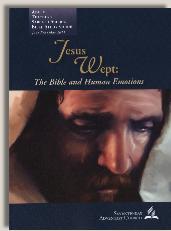|
||||||||||||||
Commentary on "Emotions"
Day 3: Monday, December 27, 2010 - Positive Emotions
Overview
Today’s lesson looks at positive emotions and how they increase longevity and health in contrast with negative emotions which produce debilitating physical reactions. The lesson asks the reader to read Galatians 5:22 and to comment on how the fruit of the Spirit makes a difference in the way people experience life. It than asks one to read Colossians 3:12-14 and concludes that love generates other positive emotions that can be translated into highly desirable behaviors.
Observations
Again, emotions are merely data. The Bible gives us no commands to attempt to alter or manipulate our feelings. Instead, the Psalms give us many examples of crying to God and offering our negative emotions to Him, pouring out our fears and hurts but ultimately submitting to God’s sovereign will and trusting Him to bring bout justice and resolution. Psalm 28 is an example of David’s crying to the Lord God and ending his plea for mercy with his statement of trust and surrender to His will:
To you, O LORD, I call; my rock, be not deaf to me, lest, if you be silent to me, I become like those who go down to the pit. Hear the voice of my pleas for mercy, when I cry to you for help, when I lift up my hands toward your most holy sanctuary.
Do not drag me off with the wicked, with the workers of evil, who speak peace with their neighbors while evil is in their hearts. Give to them according to their work and according to the evil of their deeds; give to them according to the work of their hands; render them their due reward. Because they do not regard the works of the LORD or the work of his hands, he will tear them down and build them up no more.
Blessed be the LORD! For he has heard the voice of my pleas for mercy. The LORD is my strength and my shield; in him my heart trusts, and I am helped; my heart exults, and with my song I give thanks to him.
The LORD is the strength of his people; he is the saving refuge of his anointed. Oh, save your people and bless your heritage! Be their shepherd and carry them forever. (Psalm 28:1; Psalm 28:2-9 ESV)
The Bible never tells us that our emotions determine our quality of life or health or success. Instead, our well being is linked directly to our trust in God and our submission to His promises and His word.
The lesson instructs us to read Galatians 5:22 and then asks, “How should the fruit of the Spirit make a difference in the way people experience life?”
Galatians 5:22 says:
But the fruit of the Spirit is love, joy, peace, patience, kindness, goodness, faithfulness, (ESV)
Interestingly, the lesson cuts off this passage without including verse 23:
gentleness, self-control; against such things there is no law. (Galatians 5:23 ESV)
Verse 23 is the end of the sentence, and without it verse 22 is not a complete thought. In context, Galatians 5:22-23 is contrasting the fruit of the Spirit with the works of the flesh. Paul is making the point that when we are alive in the Spirit, we are led by the Spirit, and we “are not under the law” (v. 18). The entire book of Galatians is an explanation of the fact the law is no longer binding on Christians who have been made alive in the Spirit. The law was temporary, and in Christ we have the Holy Spirit giving us the life of God and the work of God.
The lesson yanks verse 22 entirely out of context and asks the reader to apply “love, joy, peace, patience, kindness, goodness, faithfulness” to a person’s experience of life. This is absolutely not what Galatians 5:22 is saying.
Galatians 5:22 is identifying the “fruit” (notice that “fruit” is singular, not plural—all these qualities are inseparable as ONE FRUIT given by the Holy Spirit) of the Holy Spirit in the life of one who has been born of God through belief and entrustment to the Lord Jesus and His sacrifice for one’s sin. These qualities are not “emotions” but are divine attributes that become available to us when God in the person of the Holy Spirit indwells us. They are not qualities that we develop or perfect by deciding we need positive emotions and praying for them.
They are the actual mark of God in us, and He gives these qualities to us, asking us to offer to Him our flesh with its desires and passion, clothing ourselves with Jesus Christ:
But put on the Lord Jesus Christ, and make no provision for the flesh, to gratify its desires. (Romans 13:14 ESV)
God does not give us positive emotions. He gives us Himself—and He asks us to trust Him, as David did, when our emotions are negative and overwhelming. He asks us to surrender our feelings and desires and to trust Him to care for us and to give us what we need, including His heart and His mind. He asks us to give up our right to live in our “flesh”; He asks us to give up fighting to feel “good”. He asks us to trust Him when we feel horrible; He will heal our hearts and give us His own peace and joy and patience and longsuffering and gentleness and kindness.
Colossians 3:12-14 says:
Put on then, as God's chosen ones, holy and beloved, compassionate hearts, kindness, humility, meekness, and patience, bearing with one another and, if one has a complaint against another, forgiving each other; as the Lord has forgiven you, so you also must forgive. And above all these put on love, which binds everything together in perfect harmony. (ESV)
This passage is not treating “love” as an emotion, as the lesson interprets it. Contrary to the lesson’s question, “What consequences follow when someone puts into practice Paul’s words in this passage”, no one is able to :put into practice Paul’s words. Only by believing in the Lord Jesus, entrusting ourselves to Him, and being born again of the Holy Spirit can this text mean anything. We cannot clothe ourselves with good emotions or motives or actions. We are either acting in the flesh as a resident of the domain of darkness (Col 1:13), or we are alive in the Spirit and finally able to choose to “put to death the deeds of the flesh” and to live by the Spirit:
For those who live according to the flesh set their minds on the things of the flesh, but those who live according to the Spirit set their minds on the things of the Spirit. For to set the mind on the flesh is death, but to set the mind on the Spirit is life and peace. For the mind that is set on the flesh is hostile to God, for it does not submit to God's law; indeed, it cannot. Those who are in the flesh cannot please God.
You, however, are not in the flesh but in the Spirit, if in fact the Spirit of God dwells in you. Anyone who does not have the Spirit of Christ does not belong to him. But if Christ is in you, although the body is dead because of sin, the Spirit is life because of righteousness. (Romans 8:5-10 ESV)
The issue of examining our own emotional states and evaluating how they impact our decisions and lives is never a teaching of the Bible. Instead, we are commanded to trust God, to clothe ourselves with the Lord Jesus, to put to death the deeds of the flesh, and to trust the Lord Jesus and His promises no matter what our emotional state.
Positive emotions are not the measure of our relationship with the Lord Jesus. Rather, our willingness to submit and surrender our desires and feelings and temptations to Him and to be willing to know what is true and to stand in what is real—these are the marks of our trust and dependence on Him.
Emotions are not the issue; they are not the measure of our spiritual health. They may be a fruit of our spiritual health, or they may actually be indicators of our own brokenness or danger. But our spiritual health depends upon our level of trust in God and our willingness to give up “ourselves” to Him.
He transforms us with His Spirit through the truth of His Word. If we focus on our emotions, we will be led astray. We are to embrace God’s Word—and He has promised that it will never return to Him empty:
For as the heavens are higher than the earth, so are my ways higher than your ways and my thoughts than your thoughts. For as the rain and the snow come down from heaven and do not return there but water the earth, making it bring forth and sprout, giving seed to the sower and bread to the eater, so shall my word be that goes out from my mouth; it shall not return to me empty, but it shall accomplish that which I purpose, and shall succeed in the thing for which I sent it. (Isaiah 55:9-10; Isaiah 55:11 ESV)
God is in control; when He is our Lord, we can rest in the fact that He will care for us, redeem our circumstances, and provide all we need. His word will not fail; He will accomplish His purposes. We can trust Him!
Copyright 2010 BibleStudiesForAdventists.com. All rights reserved. Revised December 27, 2010. This website is published by Life Assurance Ministries, Glendale, Arizona, USA, the publisher of Proclamation! Magazine. Contact email: BibleStudiesForAdventists@gmail.com.
The Sabbath School Bible Study Guide and the corresponding E.G. White Notes are published by Pacific Press Publishing Association, which is owned and operated by the Seventh-day Adventist church. The current quarter's editions are pictured above.
Official Adventist Resources
Standard Edition Study Guide Week 1
Teacher's Edition Study Guide Week 1
Easy Reading Edition Study Guide Wk 1
Search the Complete Published Ellen G. White Writings


